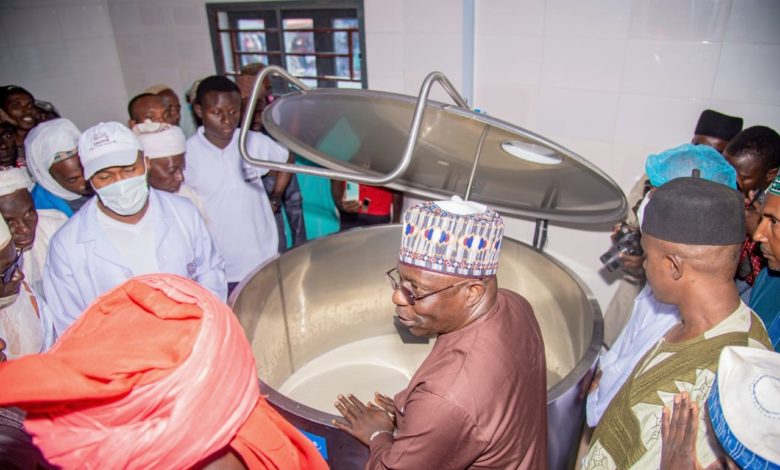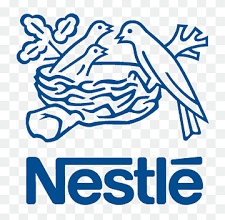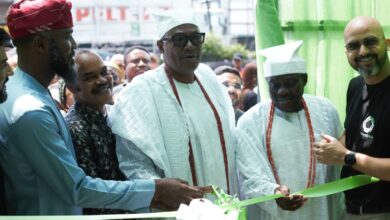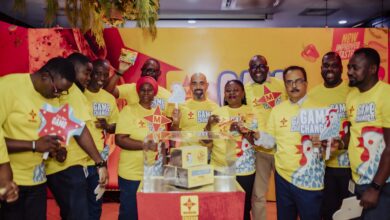Nestle Nigeria: Revolutionizing Milk Collection In Nigeria

Nestlé Nigeria Milk Collection Center at the Ladugga Grazing Reserve in Kachia LGA, Kaduna State
With the annual demand for fresh milk production in Nigeria hovering around 560,000 and 600,000 tonnes, Nigeria’s demand for milk is estimated to grow to about 1.7 million tonnes per year hence the need for both local and foreign investment to bridge the demand gap.
Although milk production has witnessed a significant leap from 229,000 tonnes in 1972 to 531,587 tonnes in 2021 representing a growth rate of 1.89 per cent, findings showed that Nigeria’s milk market is projected to grow by 6.56 per cent in the next five years resulting in a market volume of $27 billion in 2028.
It is no doubt that milk production in Nigeria has been challenged with several issues ranging from low production output, poor grass quality and inadequate storage and processing facilities.
The Food and Agriculture Organisation (FAO) of the United Nations said that malnutrition is prevalent in Nigeria because of the low consumption of milk and other dairy products.
The World Health Organisation (WHO) recommends milk consumption of 210 litres per person annually, while an average Nigerian consumes about eight litres of milk annually. This is as a result of the unavailability of the product coupled with the fact that Nigerian cattle produce less milk due to low investment and slow government policy intervention which would have provided incentives for increased dairy production.
This is just as the Raw Materials Research and Development Council (RMRDC) said that Nigerian cows produce about 1.5 litres to two litres of milk daily.
Speaking at a roundtable meeting in Lagos with the theme: “Heart Healthy Milk, Nutritious Food and Livelihood,” experts said eight litres per year is equivalent to 21.9mls of milk per day, which is below the global average of 44 litres per person per year and World Health Organisation (WHO) recommendation of 210 litres per person per year.
As Nigerians joined the world to mark 2023 World Milk Day, stakeholders have decried the nation’s low intake of milk, saying per capita milk consumption is estimated at eight litres per year, they emphasised the need to encourage adequate milk intake among Nigerians.
“Milk is food and it should be consumed right from the womb to adulthood because milk contains a lot of important nutrients such as carbohydrates, protein and vitamins, , Executive Director, Nigerian Heart Foundation (NHF) Dr Kingsley Akinroye said.
In order to make milk available for Nigerians, Nestle Nigeria, the Good Food, Good Life Company, has continued to boost milk collection in Nigeria by commissioning a new milk collection centre in Kaduna and enhancing the capacity of its milk collection centre at Paikon-Kore community in Abuja.
The Commissioning of Nestlé Nigeria Milk Collection Center at the Ladugga Grazing Reserve in Kachia LGA, Kaduna State in 2022 by the Honourable Commissioner for Agriculture, Kaduna State, Malam Ibrahim Hassaini, was a milestone achievement and this has increased the firm’s milk collection and cooling capacity to 3000 litres per day.
Nestlé, in partnership with CBI Innovations Limited, a social enterprise, is implementing a five-year dairy development project that aggregates smallholder dairy producers to improve the productivity of the local dairy industry in Nigeria, supported by the International Fertilizer Development Centre (IFDC-2CALE).
In her address at the opening ceremony, Victoria Uwadoka, the Corporate Communications and Public Affairs Manager, Nestlé Nigeria said, “We are proud of the progress we have made since the first engagement with the Kaduna State Ministry of Agriculture which culminated in the start of operations here in Ladugga Grazing Reserve in 2021.”
“Nestlé Nigeria’s dairy project is built on three pillars: Better Feed and Fodder, Quality Milk Products and Resilient communities. We have made significant progress on these 3 pillars and the opening of this Milk Collection and Cooling Centre will help us consolidate on this progress which has yielded year on year increase in milk volumes month on month. We can safely increase the 1,396L/day we are currently collecting in Ladduga, thanks to the increased collection and chilling capacity with the launch of this facility today.”
The achievement of milk volumes in Nestle’s dairy development project is made possible by the engagement and empowerment of 77 cooperatives and 31 aggregators in the Ladugga Grazing Reserve community. The project has also made significant investments in improving herd health, improving infrastructure including provision of water and the establishment of cool chain infrastructure.
Speaking at the inaugural ceremony, the Kaduna State Commissioner for Agriculture, who was represented by the Permanent Secretary, Alhaji Manisibi Mohammed Kabiru thanked Nestlé and CBI Innovations Limited “For initiating this laudable Milk Collection Centre in Kaduna State to accelerate investment in the dairy sector of the state and to empower pastoralists and smallholder farmers in the dairy value chain.
“Also, the timely intervention of the project will go a long way to support the State’s potential to utilize livestock production merits, improve the nomadic standard of living, foster the coexistence between the farmers and herders and help to mitigate the recurrent crisis.”
Victoria reaffirmed Nestlé’s commitment to contribute to the development of the dairy sector in Nigeria through investments in farmer capacity building, infrastructure improvement and novel technology to create sustainable routes to market for the pastoralists.
To reach more pastoralists, Nestlé has installed solar-powered “Milk Banks” within 300KM radius of the communities where the pastoralists move to in search of fodder and water. One has already been installed at Crossing, near the Ladduga Grazing Reserve. The technology, equipped with a single-phase compressor to achieve low power consumption to store and chill the milk collected at the source, is the first of its kind in Nigeria.
The Corporate Communications and Public Affairs Manager, Nestle Nigeria, Victoria Uwadoka had, while speaking at the 2022 World Milk Day celebration held at Paikon-Kore community, said that the Company’s intervention at the milk collection Centre in the Paikon-Kore community in Gwagwalada has increased daily milk collection from 1500 litres to 3000 litres.
She said the Nestle Livestock Development Programme which was co-created by the Convention on Business Integrity (CBI) and 2Scale, is aimed at supporting the Nigerian Government National Livestock Transformation Plan (NLTP).
“World Milk Day is significant to us in light of the Nestle livestock development program which we co-created with CBI and 2scale in order to support the government’s National Livestock Development Plan.
“The objective matches our objective which is to create a viable ecosystem for dairy where we are improving not just the production of milk but also improving community dynamics everybody is living in a peaceable environment we are ensuring food security and economic development.
“It is also significant to mark the progress that we have made in the past two years in the dairy sector, as at June last year we only collected 200 litres of milk but today they are collecting 1500 litres of milk per day and we have been able to do this by building trust with the community by engaging with them through their leaders, we have also been able to train them on milk handling practices to enable them to have high quality for the milk that we receive daily.
“We have invested in refurbishing the collection centre, now it has a capacity of producing 3000 litres per day, we use solar energy to power the collection centre to reduce carbon footprint in our environment and also training of the aggregators, vaccination and deworming the cows and know how many they are, also providing bikes to aggregators and collectors, all this are investment we have made in this project to make it to where it is up to date.
She said through the programme, Nestle has improved the health of the animals, to make sure that they have good feed, have enough water and ensure that they are vaccinated and receive the right vitamins.
“So under this project, we have vaccinated over 6,000 herds of cattle and provided vitamin and multi-minerals distributed to the community, those 6000 herds of cattle have been dewormed as well so they are healthier and ale to produce more milk.”
Uwadoka further stated that five industrial boreholes have been built and commissioned; three of them are for the cattle to make sure they have adequate water.
“We have over 30 cooperatives in Paiko Kore who are working with us in which 15 are actively supplying milk to us daily, we have also provided motorbikes to the aggregators to reduce the time when the cows are milked and when it gets to the collection centre.
“We have been able to reduce rejection to lower than 0.4 per cent within the project and that is remarkable because milk is very sensitive and must retain its consistency before being taken to the production stage, this is a success for us not just what we have done but to celebrate the people that have done this with us.
“They are our partners and collaborators and we are committed to producing this quality milk every day and providing for the families and the community at large,” she noted.
She revealed that Nestle is giving a premium above the market price to the aggregators and the producers.
Uwadoka said the Company is targeting to build demo farms in Abuja. “We have requested the FCT to give us land in this regard and we are waiting for them where we will not just produce our milk farms but show farmers the good practices that we impact and so use the opportunity to improve the local breeds that we have,” she added.
Meanwhile, data from the National Bureau of Statistics (NBS) has shown that at least N72.9 billion worth of milk was imported in 2022.
The report titled: “Foreign Trade Statistics”, noted that N27.6 billion worth of the commodity was imported in the first quarter of the year, followed by N21.3 billion in the second quarter and N23.9 billion in the third quarter, while the data for the fourth quarter was not available as the product did not make it into the top five imported raw material products.
To produce enough quantity of milk for Nigerians, there is a need for increased investment in the dairy sector. The government on its part is expected to make policies and provide frameworks that will encourage local production and more participation in the sector through public-private partnerships thereby discouraging importation of the product.




